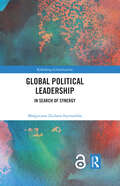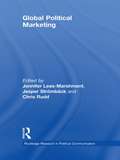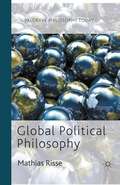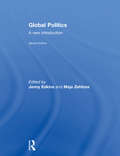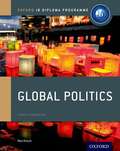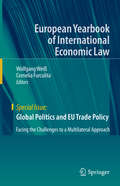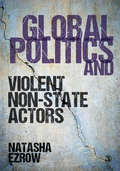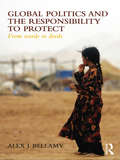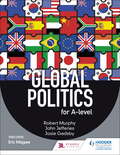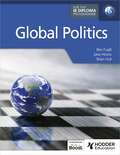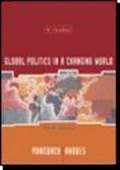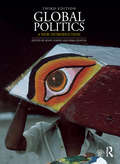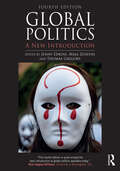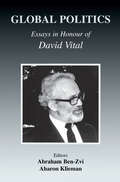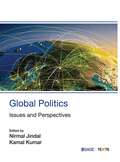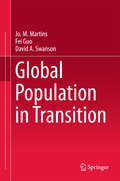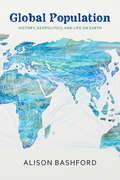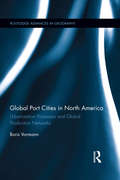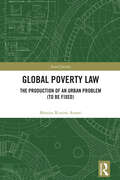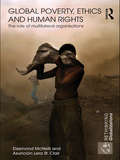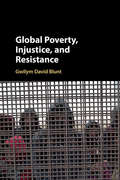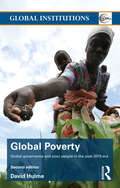- Table View
- List View
Global Political Leadership: In Search of Synergy (Rethinking Globalizations #1)
by Małgorzata Zachara-SzymańskaGlobal Political Leadership explores contemporary shifts in leadership, and the related leadership crisis, in the global world. Globalization is now perceived as a threatening and hostile force, with many of its advocates and political supporters turning away from it, but its processes cannot be reversed. New powers emerge, old ones re-emerge, and uncertainty about the future global order is increasing. This book tells the inside stories of global power games and asks important questions about the leadership crisis in the Western world. The author provides an interpretative framework for contemporary shifts within the Western political sphere based on the concept of global leadership. This framework presents the nature of the transformations caused by global processes, as part of which force and coercion have ceased to be the main modus operandi of the international realm. The issue of global political leadership is virtually absent from IR literature, while being widely exploited by managerial and organizational studies. However, all social organizations have ‘gone global’ within the last 30 years; they are more interconnected and more dependent on global processes, so the question of effective leadership strategies matching these new realities is highly necessary, even—or especially—at a time when globalization is no longer seen as a leading political program. This book will be of great interest to students and scholars of global affairs, politics and international relations, leadership and development, and diplomatic studies.
Global Political Marketing (Routledge Research in Political Communication)
by Jennifer Lees-Marshment Jesper Stromback Chris RuddThere is increasing awareness of growing similarities in political marketing practices around the world. Global political marketing is a comprehensive analysis of why, how and with what affect parties use political marketing in a range of political systems - presidential, parliamentary, two and multi-party, and established and emerging democracies. Written by a team of 25 international expert authors, the volume explores the impact of systemic features such as the party and electoral system, analysing how parties use marketing through 14 detailed country studies. The book explores the notion that political marketing is used by parties to both sell and design political products, is by no means confined to the opposition, and that many opinions besides those of the voters are considered in product design, including ideological anchors, expert opinion and party members’ input. The authors also explore how other factors impact on political marketing effectiveness, such as the ability of governments to communicate delivery, stay in touch, the role of the media and party unity and culture. Finally the work discusses the democratic implications of market-oriented parties, highlighting the need for debate about the relationship between citizens and governments and the prospects for democracy in the 21st century. Including a practitioner perspective as well as rigorous academic analysis, this collection provides the first global comprehensive overview of how political parties market themselves, it will be of great interest to all scholars of political marketing, parties and elections and comparative politics.
Global Political Philosophy
by Mathias RisseThis book focuses on normative questions that arise about globalization. Much social science research is devoted to exploring the political, legal, social and economic changes that occur all around us. This books offers an introductory treatment of the philosophical questions that arise about these changes. Why would people have human rights? We will be looking at different answers to this question. Could there be a universal morality in the first place? This question captures a particular kind of skepticism that has also been applied to the human rights movement and needs to be addresses for the Universal Declaration of Human Rights to be intellectually credible. Ought there to be states? Perhaps there are more appropriate ways of organizing humanity politically. What does distributive justice require at the global level? The world in which we live is one of a striking inequality that challenges us to explore what a just world would look like. What does justice require of us with regard to climate change? We now live in a geological era sometimes called the Athropocene: it is human action that has the biggest impact on the future of all life. How should we think about fairness in trade? Trade, after all, ties people together around the world. And what does justice imply for immigration policy? Each of these questions is answered in its own chapter. Introductions to political philosophy normally focus mostly or entirely on domestic questions. This introduction is concerned with questions of global scope throughout.
Global Politics
by Maja Zehfuss Jenny EdkinsThe 2nd edition of Global Politics: A New Introduction continues to provide a completely original way of teaching and learning about world politics. The book engages directly with the issues in global politics that students are most interested in, helping them to understand the key questions and theories and also to develop a critical and inquiring perspective. Completely revised and updated throughout, the 2nd edition also offers additional chapters on key issues such as environmental politics, nationalism, the internet, democratization, colonialism, the financial crisis, political violence and human rights. Global Politics: Examines the most significant issues in global politics - from war, peacebuilding, terrorism, security, violence, nationalism and authority to poverty, development, postcolonialism, human rights, gender, inequality, ethnicity and what we can do to change the world Offers chapters written to a common structure which is ideal for teaching and learning and features a key question, an illustrative example, general responses and broader issues Integrates theory and practice throughout the text, by presenting theoretical ideas and concepts in conjunction with a global range of historical and contemporary case studies Drawing on theoretical perspectives from a broad range of disciplines including international relations, political theory, postcolonial studies, sociology, geography, peace studies and development this innovative textbook is essential reading for all students of global politics and international relations.
Global Politics (Int-bacc Ser.)
by Max KirschEquipping teachers and learners to succeed in Global Politics from day 1, this student Course Book has been developed directly with the IB. Helping to develop politically engaged learners who can think critically about the changing 21st Century world, you can rely on it providing the most comprehensive coverage of this subject. Embracing a truly concept-based approach, fully in line with the syllabus, and structured around the central theme of People, Power and Politics, it ensures learners develop critical understanding of big picture political issues, problems and solutions. Fully cover the syllabus - written by syllabus developer and UNESCO Chair in Human and Cultural Rights Max Kirsch and developed directly with the IB Adopt a fully concept-based approach - the truly concept-based structure drives trans-disciplinary understanding Build critical thought - student-centered activities drive exploration and analysis Relate politics to the real world - a rich base of current, engaging case-studies ensures subject material is immediately relevant to learners own experiences Equip learners for assessment - assessment support directly from the IB accurately prepares students to achieve in exams
Global Politics and EU Trade Policy: Facing the Challenges to a Multilateral Approach (European Yearbook of International Economic Law)
by Wolfgang Weiß Cornelia FurculitaThis book explores how the European Union designs its trade policy to face the most recent challenges and to influence global policy issues. It provides with an interdisciplinary perspective, by combining legal, political, and economic approaches. It studies a broad set of trade instruments that are used by the EU in its trade policy, such as: trade agreements, multilateral initiatives, unilateral trade policies, as well as, internal market tools. Therefore, the contributions to this volume present the EU’s Trade Policy through different lenses providing a complex view of it.
Global Politics and Violent Non-state Actors: Understanding Violence, Terror And Crime
by Dr Natasha EzrowMoving beyond terror groups to examine non-state actors including warlords, gangs and private security companies, Violent Non-State Actors: Guides you through the core theories and concepts, taking a multidisciplinary approach Examines different explanations for the emergence of violent non-state actors as well as strategies for dealing with them Weaves in international case studies from groups including the Islamic State, Los Zetas, Hamas, and Al Qaeda, as well as discussion questions, further reading and definitions of key terms A must read for upper-level undergraduate and postgraduate students in politics, international relations, security and terrorism studies.
Global Politics and Violent Non-state Actors: Understanding Violence, Terror And Crime
by Dr Natasha EzrowMoving beyond terror groups to examine non-state actors including warlords, gangs and private security companies, Violent Non-State Actors: Guides you through the core theories and concepts, taking a multidisciplinary approach Examines different explanations for the emergence of violent non-state actors as well as strategies for dealing with them Weaves in international case studies from groups including the Islamic State, Los Zetas, Hamas, and Al Qaeda, as well as discussion questions, further reading and definitions of key terms A must read for upper-level undergraduate and postgraduate students in politics, international relations, security and terrorism studies.
Global Politics and the Responsibility to Protect: From Words to Deeds (Global Politics and the Responsibility to Protect)
by Alex J. BellamyThis book provides an in-depth introduction to, and analysis of, the issues relating to the implementation of the recent Responsibility to Protect principle in international relations The Responsibility to Protect (RtoP) has come a long way in a short space of time. It was endorsed by the General Assembly of the UN in 2005, and unanimously reaffirmed by the Security Council in 2006 (Resolution 1674) and 2009 (Resolution 1894). UN Secretary-General Ban Ki-moon has identified the challenge of implementing RtoP as one of the cornerstones of his Secretary-Generalship. The principle has also become part of the working language of international engagement with humanitarian crises and has been debated in relation to almost every recent international crisis – including Sudan, Sri Lanka, Myanmar, Georgia, the Democratic Republic of Congo, Darfur and Somalia. Concentrating mainly on implementation challenges including the prevention of genocide and mass atrocities, strengthening the UN’s capacity to respond, and the role of regional organizations, this book introducing readers to contemporary debates on R2P and provides the first book-length analysis of the implementation agenda. The book will be of great interest to students of the responsibility to protect, humanitarian intervention, human rights, foreign policy, security studies and IR and politics in general.
Global Politics for A-level
by Robert Murphy John Jefferies Josie GadsbyExpand your students' political thinking and put global politics into context with this brand new textbook; created for the 2017 politics specifications. Combining up-to date commentary and analysis with case studies and features, this textbook will help develop an understanding of politics from the local to the international, revealing how political issues affect us all.- Comprehensive coverage of the latest developments in global politics - Analysis of the perspectives of liberalism and realism- Definitions of key terms and concepts to help clarify knowledge and understanding of political language- Exam focus sections at the end of each chapter to test and develop understanding of key topics, offering practice for short and essay questions
Global Politics for A-level
by Robert Murphy John Jefferies Josie GadsbyExpand your students' political thinking and put global politics into context with this brand new textbook; created for the 2017 politics specifications. Combining up-to date commentary and analysis with case studies and features, this textbook will help develop an understanding of politics from the local to the international, revealing how political issues affect us all.- Comprehensive coverage of the latest developments in global politics - Analysis of the perspectives of liberalism and realism- Definitions of key terms and concepts to help clarify knowledge and understanding of political language- Exam focus sections at the end of each chapter to test and develop understanding of key topics, offering practice for short and essay questions
Global Politics for the IB Diploma (For the IB Diploma)
by Brian Hull Ben Fugill Jane HironsDeveloped in cooperation with the International Baccalaureate®Trust an experienced team of IB educators to help develop the key skills needed to understand global politics with a range of contemporary case studies, different perspectives on political issues provided throughout and extensive assessment support.- Build analytical skills with engaging content comprising of case studies and pedagogy to write them.- Improve performance with knowledge-checking quizzes at the end of each chapter along with essay writing and exam guidance that includes case studies that can be deployed as examples and evidence for Paper 2 responses.- Build inquiry skills through class discussion questions that foster intercultural understanding, open mindedness and respect.- Integrate Theory of Knowledge into your lessons with TOK links and Inquiries, written by our bestselling TOK author John Sprague, that provide real-world examples, case studies and questions.- Develop ATL skills with a range of engaging activities.- Support EAL students with content and support that is tailored to their needs.This coursebook has been reviewed by Melanie Wilson, Head of Global Politics at UWC Southeast Asia.Contents list How to use this book The case study approachCore: Understanding power and global politics 1 Understanding power and global politics Thematic Studies 2 Development and sustainability 3 Peace and conflict 4 Rights and justice 5 Engagement activity/Project 6 Assessment OnlineGlossaryeBook Interactive case studies
Global Politics for the IB Diploma (For the IB Diploma)
by Brian Hull Ben Fugill Jane HironsDeveloped in cooperation with the International Baccalaureate®Trust an experienced team of IB educators to help develop the key skills needed to understand global politics with a range of contemporary case studies, different perspectives on political issues provided throughout and extensive assessment support.- Build analytical skills with engaging content comprising of case studies and pedagogy to write them.- Improve performance with knowledge-checking quizzes at the end of each chapter along with essay writing and exam guidance that includes case studies that can be deployed as examples and evidence for Paper 2 responses.- Build inquiry skills through class discussion questions that foster intercultural understanding, open mindedness and respect.- Integrate Theory of Knowledge into your lessons with TOK links and Inquiries, written by our bestselling TOK author John Sprague, that provide real-world examples, case studies and questions.- Develop ATL skills with a range of engaging activities.- Support EAL students with content and support that is tailored to their needs.This coursebook has been reviewed by Melanie Wilson, Head of Global Politics at UWC Southeast Asia.Contents list How to use this book The case study approachCore: Understanding power and global politics 1 Understanding power and global politics Thematic Studies 2 Development and sustainability 3 Peace and conflict 4 Rights and justice 5 Engagement activity/Project 6 Assessment OnlineGlossaryeBook Interactive case studies
Global Politics in a Changing World: a Reader (Third Edition)
by Richard W. Mansbach Edward RhodesBy presenting illustrative and contemporary news stories within the context of conceptual discussions of global politics, this text provides a stimulus for discussion, debate, and discovery, and enables students to see the events of the day as part of a larger, more understandable process of change. We find that news accounts, read in the light of the conceptual writings that frame each chapter, offer a variety of exciting teaching possibilities, including use as mini-case studies. In this role, they provide material for individual or group classroom activities, such as debates or role-playing exercises, and invite a wide range of writing assignments, such as critical reviews, pro-and-con analyses, policy memos, and longer reports. We have deliberately sought news stories that will not only expose students to the enormous diversity of global politics but that will, by the problems they pose, challenge students to develop a range of skills including critical reading, analytical thinking, and moral reasoning.
Global Politics: A New Introduction
by Maja Zehfuss Jenny EdkinsThe third edition of Global Politics: A New Introduction continues to provide a completely original way of teaching and learning about world politics. The book engages directly with the issues in global politics that students are most interested in, helping them to understand the key questions and theories and also to develop a critical and inquiring perspective. Completely revised and updated throughout, the third edition offers up-to-date examples engaging with the latest developments in global politics, including the Syrian war and the refugee crisis, fossil fuel divestment, racism and Black Lives Matter, citizen journalism, populism, and drone warfare. Global Politics: examines the most significant issues in global politics – from war, peacebuilding, terrorism, security, violence, nationalism and authority to poverty, development, postcolonialism, human rights, gender, inequality, ethnicity and what we can do to change the world; offers chapters written to a common structure, which is ideal for teaching and learning, and features a key question, an illustrative example, general responses and broader issues; integrates theory and practice throughout the text, by presenting theoretical ideas and concepts in conjunction with a global range of historical and contemporary case studies. Drawing on theoretical perspectives from a broad range of disciplines, including international relations, political theory, postcolonial studies, sociology, geography, peace studies and development, this innovative textbook is essential reading for all students of global politics and international relations.
Global Politics: A New Introduction
by Maja Zehfuss Jenny Edkins Thomas GregoryGlobal Politics: A New Introduction engages directly with questions that those coming to the study of world politics bring with them. From that innovative starting point, it explores key issues through a critical and inquiring perspective, presenting theoretical ideas and concepts in conjunction with a global range of historical and contemporary case studies.Revised and updated throughout, the fourth edition offers examples engaging with the latest developments in global politics: the climate crisis and anthropocentrism, Indigenous experiences and thinking, racism and the rise of xenophobia, artificial intelligence, citizen journalism, global health and pandemic response and drone warfare.Global Politics:• examines most significant issues in global politics – poverty, development, colonialism, human rights, gender, inequality, race, war, peacebuilding, security, violence, nationalism, authority and what we can do to change the world;• offers chapters written to a common structure ideal for teaching and learning and features a key question, an illustrative example, general responses and broader issues;• integrates theory and practice throughout the text, drawing on international relations, political theory, postcolonial studies, sociology, geography, peace studies and development.This exciting, up-to-date and ground-breaking textbook is essential reading for all those concerned about global politics.
Global Politics: Essays in Honour of David Vital (Israeli History, Politics and Society #Vol. 14)
by Aharon Klieman Abraham Ben-ZviThe essays in this volume discuss and assess the philosophies and writings of Professor David Vital. They aim to develop his work within modern diplomacy, issues relating to modern Jewish history, and within the State of Israel and its conduct of foreign relations.
Global Politics: Issues and Perspectives
by Nirmal Jindal and Kamal KumarThis comprehensive and engaging textbook addresses the most important debates within the globalisation discourse exploring its political, economic, social, cultural and technological dimensions. Global Politics: Issues and Perspectives critically examines the issues and agencies of global governance from the third world perspective. Drawing upon the theoretical aspects and emerging global trends, the authors analyse the concept of globalisation in all its manifestations, including the role of social movements, transnational actors (IMF, WTO and OECD) and NGO networks. Written as per the latest UGC guidelines and supported by informative and insightful illustrations, this book will be an invaluable resource to the UG and PG students of Political Science and International Relations as well as UGC - NET and civil services aspirants. Covering a wide range of current topics such as nuclear weapons proliferation, global terrorism, environmental politics, human security and poverty, this book will enable students to understand the key developments in global politics and analyse contemporary events and pressing concerns of the twenty-first century through a neutral lens. Key Features • Analytical approach in examining the fundamental themes and key issues in global politics • Each chapter aided by short examples, illustrations, flowcharts and review questions for self-evaluation • Extensive summary at the end of each chapter to help the reader recapitulate better
Global Population in Transition
by David A. Swanson Jo. M. Martins Fei GuoThis book deals with macro and micro aspects of population change and their inter-face with socio-economic factors and impact. It examines theoretical notions and pursues their empirical manifestations and uses multidisciplinary approaches to population change and diversity. It investigates the organic nature of the relationships between socio-economic factors and population change and the feedback loops that affect socio-economic organisation and behaviour. The book brings together material often scattered in a number of sources and disciplines that helps to understand population change and their socio-economic aspects. In addition to dealing with the more conventional factors in population dynamics in the form of fertility, mortality and migration, the book examines socio-economic forces that influence them. It discusses population evolving attributes that affect population characteristics and social and behaviour and impact on the environment. Further, it deals with social organisation and pathways that lead to different social and economic development and standards of living of diverse populations.
Global Population: History, Geopolitics, and Life on Earth (Columbia Studies in International and Global History)
by Alison BashfordConcern about the size of the world's population did not begin with the "population bomb" in 1968. It arose in the aftermath of World War I and was understood as an issue with far-reaching ecological, agricultural, economic, and geopolitical consequences. The world population problem concerned the fertility of soil as much as the fertility of women, always involving both "earth" and "life."Global Population traces the idea of a world population problem as it evolved from the 1920s through the 1960s. The growth and distribution of the human population over the planet's surface came deeply to shape the characterization of "civilizations" with different standards of living. It forged the very ideas of development, demographically defined three worlds, and, for some, an aspirational "one world."Drawing on international conference transcripts and personal and organizational archives, this book reconstructs the twentieth-century population problem in terms of migration, colonial expansion, globalization, and world food plans. Population was a problem in which international relations and intimate relations were one. Global Population ultimately shows how a geopolitical problem about sovereignty over land morphed into a biopolitical solution, entailing sovereignty over one's person.
Global Port Cities in North America: Urbanization Processes and Global Production Networks (Routledge Advances in Geography #13)
by Boris VormannAs the material anchors of globalization, North America’s global port cities channel flows of commodities, capital, and tourists. This book explores how economic globalization processes have shaped these cities' political institutions, social structures, and urban identities since the mid-1970s. Although the impacts of financialization on global cities have been widely discussed, it is curious that how the global integration of commodity chains actually happens spatially — creating a quantitatively new, global organization of production, distribution, and consumption processes — remains understudied. The book uses New York City, Los Angeles, Vancouver, and Montreal as case studies of how once-redundant spaces have been reorganized, and crucially, reinterpreted, so as to accommodate new flows of goods and people — and how, in these processes, social, environmental, and security costs of global production networks have been shifted to the public.
Global Poverty Law: The Production of an Urban Problem (To Be Fixed) (ISSN)
by Moniza Rizzini AnsariThis book demonstrates how the various legal efforts employed to eradicate global urban poverty also play a significant role in shaping it.Urban poverty has been widely examined as a social problem that requires attention and social commitment. Law is often seen as both an important contributor to the problem as well as a source of crucial tools to overcome it. In spite of this, however, poverty is surprisingly disregarded within legal scholarship. This book counters this by drawing on legal theory, legal history, and legal geography to inquire how urban poverty is made visible and invisible as a problem across global cities. More specifically, it investigates the mechanisms and networks through which global urban poverty has been conceptually and materially shaped in a way that fits the remit of global corporate philanthropy and the development aid agenda. By following law’s circuitous interactions with poverty knowledge and antipoverty interventions, the book demonstrates how it plays a historical role in making poverty seen, known, and remedied. As a result, the book argues, law consolidates a stable image of poverty as an essential ‘problem’ – to be uniformly found worldwide and so reasonably fixable with the appropriate legal reforms. Taking poverty to be a fundamental manifestation of social injustice, the book thus raises key questions about the role of law in the achievement of social justice.This innovative and insightful account of the relationship between law and poverty will appeal to scholars in critical and socio-legal studies, as well as others working in poverty studies, urban studies, development studies, geography, sociology, and social policy.
Global Poverty, Ethics and Human Rights: The Role of Multilateral Organisations (Rethinking Globalizations)
by Desmond McNeill Asunción Lera StClairSevere poverty is one of the greatest moral challenges of our times. But what place, if any, do ethical thinking and questions of global justice have in the policies and practice of international organizations? This books examines this question in depth, based on an analysis of the two major multilateral development organizations - the World Bank and the UNDP - and two specific initiatives where poverty and ethics or human rights have been explicitly in focus: in the Inter-American Development Bank and UNESCO. The current development aid framework may be seen as seeking to make globalization work for the poor; and multilateral organizations such as these are powerful global actors, whether by virtue of their financial resources, or in their role as global norm-setting bodies and as sources of hegemonic knowledge about poverty. Drawing on their backgrounds in political economy, ethics and sociology of knowledge, as well as their inside knowledge of some of the case studies, the authors show how, despite the rhetoric, issues of ethics and human rights have – for very varying reasons and in differing ways – been effectively prevented from impinging on actual practice. Global Poverty, Ethics and Human Rights will be of interest to researchers and advanced students, as well as practitioners and activists, in the fields of international relations, development studies, and international political economy. It will also be of relevance for political philosophy, human rights, development ethics and applied ethics more generally.
Global Poverty, Injustice, and Resistance
by Gwilym David BluntEach year, millions of people die from poverty-related causes. In this groundbreaking and thought-provoking book, Gwilym David Blunt argues that the only people who will end this injustice are its victims, and that the global poor have the right to resist the causes of poverty. He explores how the right of resistance is used to reframe urgent political questions: is illegal immigration a form of resistance? Can transnational social movements, such as the indigenous rights movement, provide the foundations for civil resistance to global poverty? If peaceful resistance fails, is armed struggle justified? Do people living in affluent states have a responsibility to help even if it requires them to break the law? Giving clear historical examples and engaging with fields including philosophy, international law, history, and international political studies, this volume addresses real-world issues from terrorism to activism. It will be important for anyone interested in applied philosophy and global injustice.
Global Poverty: Global governance and poor people in the Post-2015 Era (Global Institutions)
by David HulmeAround 1.4 billion people presently live in extreme poverty, and yet despite this vast scale, the issue of global poverty had a relatively low international profile until the end of the 20th century. In this important new work, Hulme charts the rise of global poverty as a priority global issue, and its subsequent marginalisation as old themes edged it aside (trade policy and peace-making in regions of geo-political importance) and new issues were added (terrorism, global climate change and access to natural resources). Key updates for the new edition: evaluation of the post-2015 Development Agenda and the Rio+20 exploration of how Colombia and Brazil are pushing a sustainability agenda as a Southern perspective to challenge the aid focus of OECD post-MDGs interests examination and discussion of the gradual shift of power and influence to the BRICs and emerging regional powers (Indonesia, Turkey, South Africa) but the lack of change in global institutions exploration of Russia’s lack of participation in the development agenda The first book to tackle the issue of global poverty through the lens of global institutions; this fully updated volume provides an important resource for all students and scholars of international relations, development studies and international political economy.
